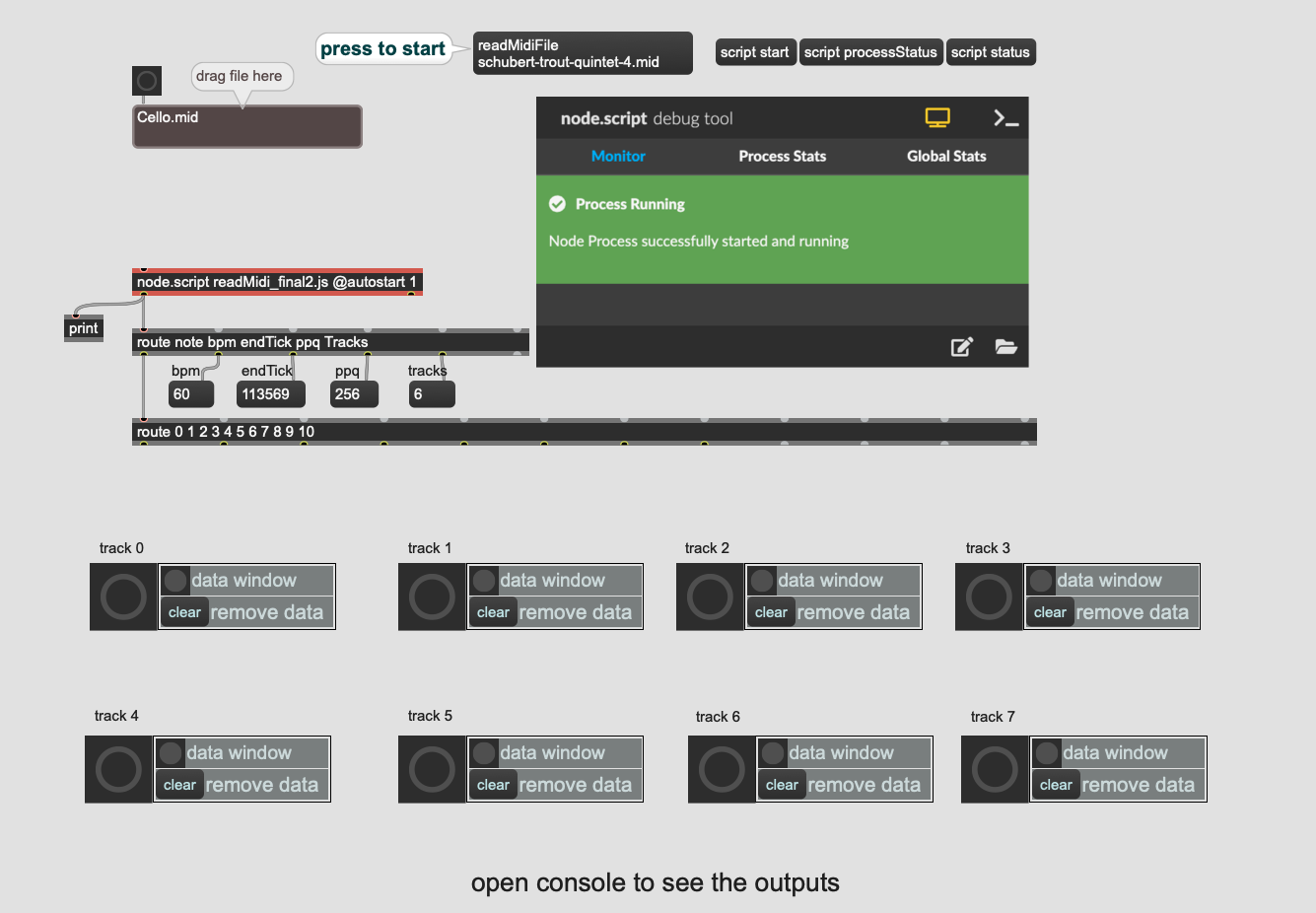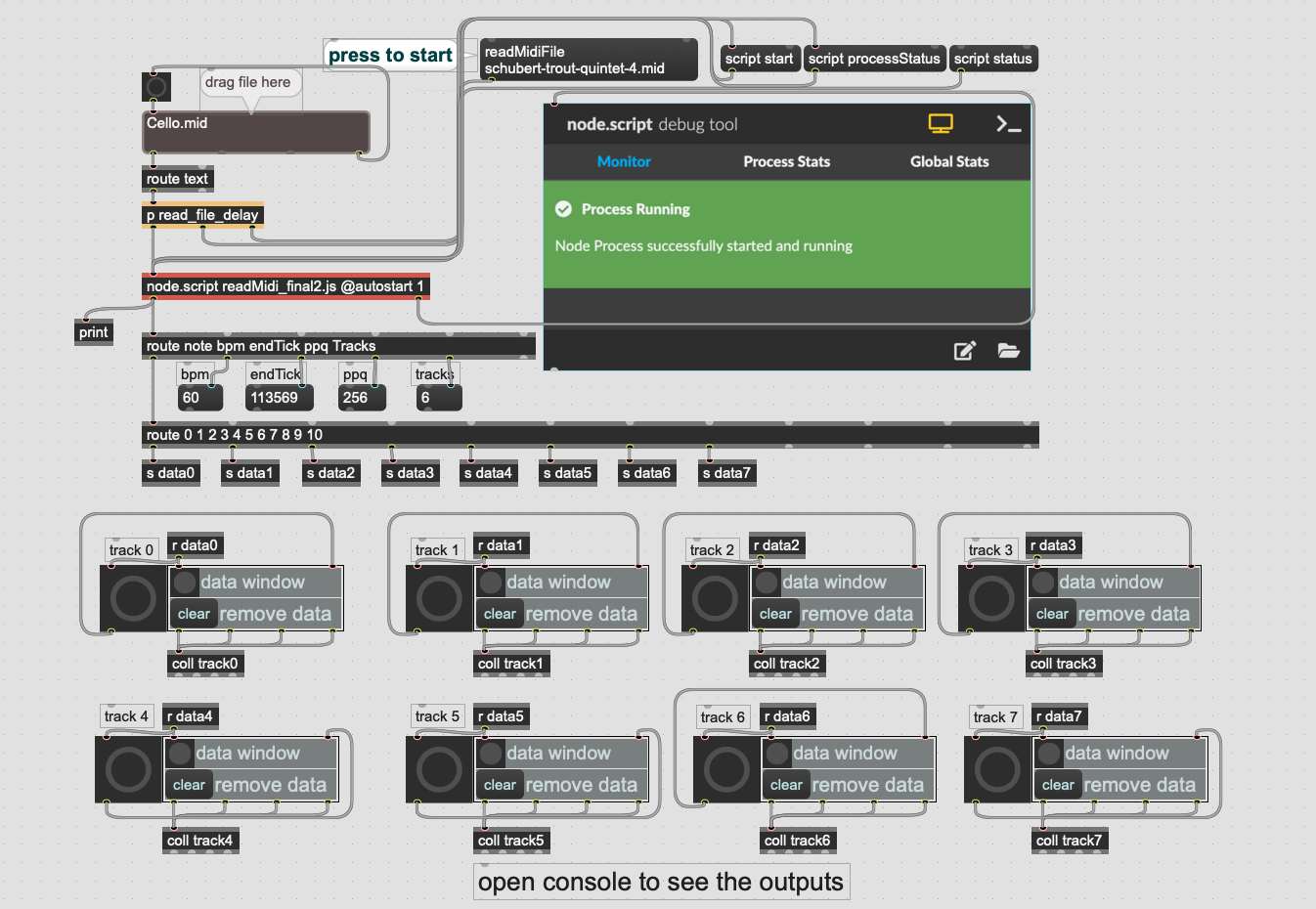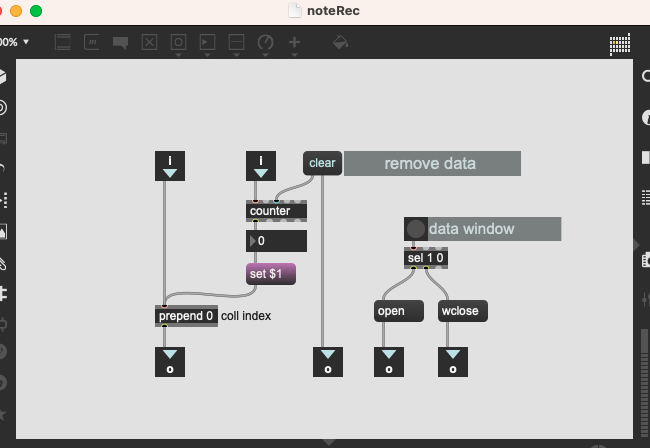MIDI parsing using JavaScript in Max



MIDI parsing in Max is quite limited so I wrote a JavaScript to do the job. Using [node.script] in Max, the MIDI information could be fully parsed. Each track's note events will be stored in seperate [coll] object. Theoretically, the track number of the MIDI file has no limit, the current patch shows 8 track collection as an example. I hope the idea of using Node to parse MIDI in Max could be helpful for Max users.
Here's the complete JS code:
const fs = require('fs');
const MidiFile = require('midi-file');
const Max = require('max-api');
// MIDI instru list
const midiInstruments = [
"acoustic grand piano", "bright acoustic piano", "electric grand piano", "honky-tonk piano",
"electric piano 1", "electric piano 2", "harpsichord", "clavinet", "celesta", "glockenspiel",
"music box", "vibraphone", "marimba", "xylophone", "tubular bells", "dulcimer", "drawbar organ",
"percussive organ", "rock organ", "church organ", "reed organ", "accordion", "harmonica",
"tango accordion", "acoustic guitar (nylon)", "acoustic guitar (steel)", "electric guitar (jazz)",
"electric guitar (clean)", "electric guitar (muted)", "overdriven guitar", "distortion guitar",
"guitar harmonics", "acoustic bass", "electric bass (finger)", "electric bass (pick)", "fretless bass",
"slap bass 1", "slap bass 2", "synth bass 1", "synth bass 2", "violin", "viola", "cello", "contrabass",
"tremolo strings", "pizzicato strings", "orchestral harp", "timpani", "string ensemble 1",
"string ensemble 2", "synth strings 1", "synth strings 2", "choir aahs", "voice oohs", "synth voice",
"orchestra hit", "trumpet", "trombone", "tuba", "muted trumpet", "french horn", "brass section",
"synth brass 1", "synth brass 2", "soprano sax", "alto sax", "tenor sax", "baritone sax", "oboe",
"english horn", "bassoon", "clarinet", "piccolo", "flute", "recorder", "pan flute", "blown bottle",
"shakuhachi", "whistle", "ocarina", "lead 1 (square)", "lead 2 (sawtooth)", "lead 3 (calliope)",
"lead 4 (chiff)", "lead 5 (charang)", "lead 6 (voice)", "lead 7 (fifths)", "lead 8 (bass + lead)",
"pad 1 (new age)", "pad 2 (warm)", "pad 3 (polysynth)", "pad 4 (choir)", "pad 5 (bowed)",
"pad 6 (metallic)", "pad 7 (halo)", "pad 8 (sweep)", "fx 1 (rain)", "fx 2 (soundtrack)",
"fx 3 (crystal)", "fx 4 (atmosphere)", "fx 5 (brightness)", "fx 6 (goblins)", "fx 7 (echoes)",
"fx 8 (sci-fi)", "sitar", "banjo", "shamisen", "koto", "kalimba", "bag pipe", "fiddle",
"shanai", "tinkle bell", "agogo", "steel drums", "woodblock", "taiko drum", "melodic tom",
"synth drum", "reverse cymbal", "guitar fret noise", "breath noise", "seashore", "bird tweet",
"telephone ring", "helicopter", "applause", "gunshot"
];
// get instrument name by program number
function getInstrumentName(programNumber) {
return midiInstruments[programNumber] || "unknown instrument";
}
// convert tempo to bpm (60 sec == 60,000,000 microsec)
function tempoToBpm(tempo) {
return 60000000 / tempo;
}
// read and parse the input midi file
function readMidi(filePath) {
try {
Max.post(`Attempting to read MIDI file: ${filePath}`);
const input = fs.readFileSync(filePath);
Max.post('MIDI file read successfully.');
const parsed = MidiFile.parseMidi(input);
Max.post('MIDI file parsed successfully.');
// Header Chunck: time resolution & tracks number
const ppq = parsed.header.ticksPerBeat;
const numOfTracks = parsed.header.numTracks;
// Tracks Chunck:
const trackEvents = {}; // events for each track
const trackInstruments = {}; // program changes for each track
let finalTicks = 0;
let bpm = null;
parsed.tracks.forEach((track, trackIndex) => {
trackEvents[trackIndex] = [];
trackInstruments[trackIndex] = {};
let currentTime = 0;
const activeNotes = {};
track.forEach(event => {
currentTime += event.deltaTime;
if (event.type === 'programChange') {
trackInstruments[trackIndex][event.channel] = event.programNumber;
}
if (event.type === 'setTempo' && bpm === null) {
bpm = tempoToBpm(event.microsecondsPerBeat);
}
if (event.type === 'noteOn') {
const noteKey = `${trackIndex}-${event.channel}-${event.noteNumber}`;
activeNotes[noteKey] = {
track: trackIndex,
type: 'noteOn',
pitch: event.noteNumber,
velocity: event.velocity,
startTime: currentTime,
channel: event.channel,
};
} else if ((event.type === 'noteOff' || (event.type === 'noteOn' && event.velocity === 0))) {
const noteKey = `${trackIndex}-${event.channel}-${event.noteNumber}`;
if (activeNotes[noteKey]) {
const noteOn = activeNotes[noteKey];
const duration = currentTime - noteOn.startTime;
trackEvents[trackIndex].push({
track: trackIndex,
type: 'noteEvent',
pitch: noteOn.pitch, // retrieves corresponding note-on info
velocity: noteOn.velocity,
startTime: noteOn.startTime,
duration: duration,
channel: noteOn.channel,
});
delete activeNotes[noteKey];
}
}
});
finalTicks = Math.max(finalTicks, currentTime);
});
// customized functions for global information
outputBpm(bpm);
outputFinalTicks(finalTicks);
outputPpq(ppq);
outputNumOfTracks(numOfTracks);
outputTrackEvents(trackEvents, trackInstruments);
} catch (error) {
Max.outlet('note', `Error reading MIDI file: ${error.message}`);
}
}
// for global information
function outputBpm(bpm) {
if (bpm !== null) {
Max.outlet('bpm', bpm);
} else {
Max.outlet('bpm', 'No BPM found, defaulting to 120');
}
}
function outputFinalTicks(finalTicks) {
Max.outlet('endTick', finalTicks);
}
function outputPpq(ppq) {
Max.outlet('ppq', ppq);
}
function outputNumOfTracks(numOfTracks) {
Max.outlet('Tracks', numOfTracks);
}
function outputTrackEvents(trackEvents, trackInstruments) {
Object.keys(trackEvents).forEach(trackIndex => {
trackEvents[trackIndex].forEach(event => {
const instrument = getInstrumentName(trackInstruments[trackIndex][event.channel]);
Max.outlet('note', event.track, instrument, event.type, event.pitch, event.velocity, event.startTime, event.duration, event.channel);
});
});
}
Max.addHandler('readMidiFile', (filePath) => {
readMidi(filePath);
});
it looks very interesting, can you upload the patch file please?
I'm following up from another thread on the forum, but I figured the follow up was better housed here instead (that other thread is: https://cycling74.com/forums/midi-file-parsing-javascript-help ).
Through a bunch of trial and error, I figured out how to use Sylvia's Javascript that she posted above. I saved that file as "midifile-sylvia.js", and together with the following patch, was able to use it. It uses the midifile npm Node script. Instructions are in the patch. Hope this helps!
